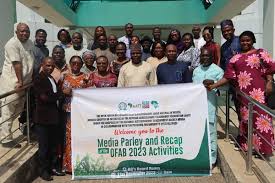As part of efforts to enhance accurate reportage of biotechnology adoption in Nigeria’s agriculture and food sector, the Open Forum on Agricultural Biotechnology (OFAB) in Africa, Nigeria chapter, an initiative of the African Agricultural Technology Foundation (AATF) has trained over 40 journalists in Abuja on science reportage.
The one-day capacity-building programme aimed to equip selected science journalists with the skills to effectively communicate advances in biotechnology using new media tools.
Addressing the journalists during the event, Director General/Chief Executive Officer (CEO) of National Biotechnological Research and Development Agency (NBRDA), Abdullahi Mustapha, urged the media practitioners to use the power they have to bridge the gap between truth and misinformation.
According to Mustapha, “In an era characterised by abundance of information, and disinformation, the role of the media as a base of truth and guidance of democracy has never been more powerful.”
He added that the practitioners’ duty is not merely to report an event, but to scrutinise, analyse and contextualise them within the framework of evidence-based knowledge”.
He asserted that, “Science is not merely a subject of academic inquiry; it is a methodology, a rigorous process of observation, experimentation and peer review that forms the foundation of our understanding of the natural world.”
Going down memory lane on the development of biotechnology, the Director, Agricultural Biotechnology NBRD, Dr. Rose M. Gidado, said biological system in human dated back to 6000 BC when the Babylonians fermented beers.
She said increases in agricultural productivity with the use of biotechnology had resulted in better farmer livelihoods.
“Biotech crops can make farming more profitable by increasing crop quality and may in some cases increase yields.
“The use of some of these crops can simplify work and improve safety for farmers. This allows farmers to spend less of their time managing their crops and more time on other profitable activities.
“Products of advance agric biotechnology can be used to enhance, support, and save cultural values and food traditions.”




